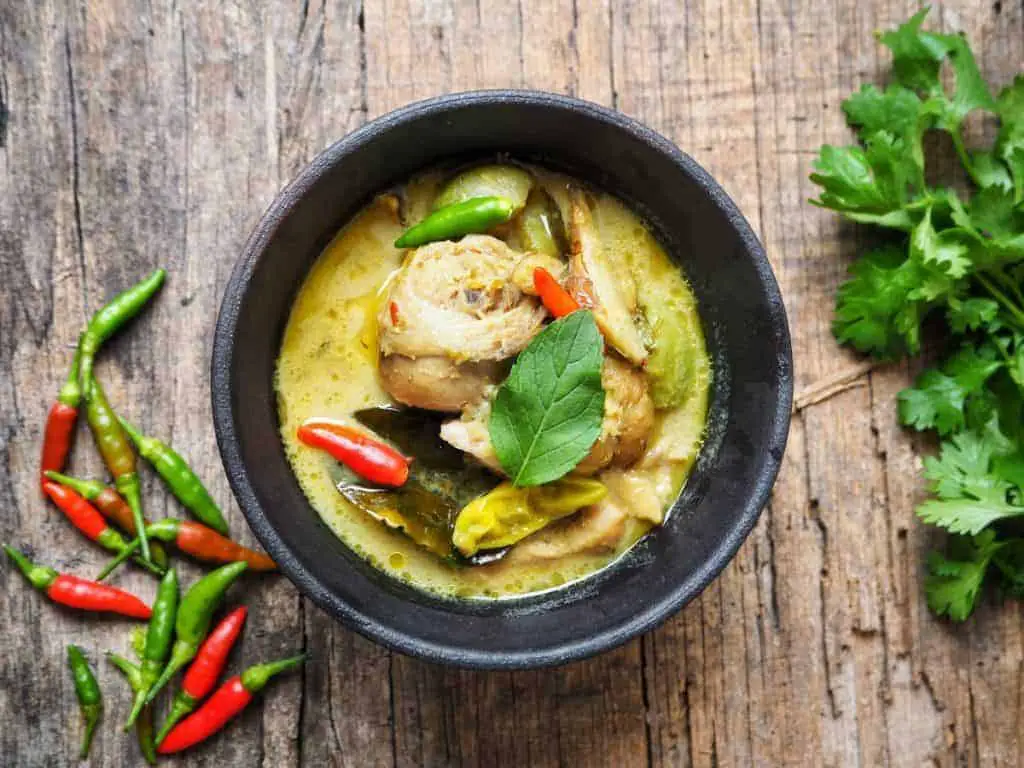This post contains affiliate links.

If you have a peanut allergy, there are obvious foods to avoid. However, some are a little trickier, especially foods that may be not native to your culture.
Thai Curry is generally safe for people with a peanut allergy. Many Thai Curry recipes do not contain peanuts. Recipes that do contain peanuts usually mention it. It’s important to look at the ingredients list or ask at a restaurant though, as curry can be made in many ways and peanuts can be used in some instances.
Though it is possible to find the curry that you are looking for, if you or a loved one has an allergy, there is a lot more that you need to know like where to go and what foods and stores to avoid.
What’s In Thai Curry
Thai Curry is a popular Thai dish, and due to its versatility can sometimes have peanuts incorporated for thickness or taste, that is why it is a tricky dish in terms of serving.
Thai Curry can be made in a multitude of ways, however, the common ingredients included are:
- Peppers
- Onions
- Olive oil
- Salt
- Ginger
- Garlic
- Carrots
- Coconut milk
- Kale
- Soy sauce
- Lime.
As you can tell, it’s not uncommon to put peanuts in curry, so if you are allergic to peanuts, you should always ask or search ingredient lists.
Coconut is also common in curry, which can is technically a tree nut, so if you have allergens other than peanuts in the nut family, be aware that there are probably not too many options of curry that you can enjoy.
Peanuts in Thai Food
Peanuts in Thai food are not an uncommon occurrence. Those with peanut allergies may not see peanuts in the menu description, but they are still part of the dish. Thai food has the highest peanut-rich food of most Asian cuisine, as it’s used for flavor, thickening, and even garnish.
This makes it particularly hard for people with peanut allergies to consume Thai food.
Peanuts can even be found in the noodles, not just the sauce.
As a result, not many people with allergies to tree nuts actually eat Thai food or Thai curry. While this is unfortunate, it’s better to be safe rather than sorry. Turning to alternative foods might be the best option.
How to Avoid an Allergic Reaction
The best way to avoid a reaction to any sort of allergy you may have is to first do your research. See if the meal you’re ordering is cooked with peanut oil, or contains peanuts on your own.
If it doesn’t, then just to be on the safe side, ask the waiter if they use peanut oil, or if it’s cooked all in the same oil. A lot of times restaurants will have a separate oil basket for people with peanut allergies, or they’ll make accommodations.

You can even call ahead and let a restaurant know if you have an even more severe allergy, and they’ll make sure your space is cleaned and free of anything that could set off an allergy.
It’s up to you to know the severity of your allergy. If you can’t even breathe the same air as peanuts, going out to eat is probably not something you do and is not a good idea in a Thai restaurant, as well as many other places.
Types of Store-Bought Curry That May Trigger a Reaction
If you don’t know if you have allergies to coconut or soy nuts along with peanuts, then there is probably no safe store-bought curry option out there.
However, if you know that you are okay with coconut, you might have a little better luck on your search.
Here are some possibly safe options, but you can search the ingredient list for yourself:
Options that aren’t safe include:
- Great Value Yellow Thai Curry Sauce Kit
- Thai Kitchen Red Curry Paste
- Good To-Go Thai Curry
Ultimately, it is up to you to decide if you want to try out new food. We recommend always talking to a doctor when it comes to such an allergy.
Asian markets might contain other varieties of curry that you can check out. Be careful when reading the ingredients and look for allergen notes that are usually separately printed on the packaging.
Restaurant Thai Curry that May Trigger a Reaction
There are not many chain restaurants that serve Thai, but one of the most popular is Thai Express. However, they say on their website that they cannot guarantee an allergy-free meal when it comes to contamination.
that they cannot guarantee an allergy-free meal when it comes to contamination.
Many local Thai restaurants have their menus online so it’s always good to consult that list if you are planning on dining out. A call can be just as helpful, as we mentioned before, they might be able to make a clear and clean space for you.
For example, a Thai food joint that is very awesome in Boise, Idaho called Thai Basil has an online menu that warns customers that there might be some allergy problems, but they also have a number to call if you want to dine in and have an allergy, so they can make some accommodations.
has an online menu that warns customers that there might be some allergy problems, but they also have a number to call if you want to dine in and have an allergy, so they can make some accommodations.
Don’t be afraid to do some research in your area so that you can find something that works for you.
How to Safely Enjoy Curry with a Peanut Allergy
As we have mentioned, there is a good chance that the Thai curry you want to enjoy has peanuts or may be contaminated. Peanut allergies can trigger horrible reactions, including anaphylaxis shock. Because of the severity of some reactions, it is very important to make sure you know what’s in it ahead of time.
This is probably obvious if you have the allergy. If you are concerned about finding something for a friend, co-worker, or loved one to eat, though, it’s important to know how serious this can be.
If you are at a restaurant, double-check that what you are ordering is free from contamination of peanuts. It’s always a good idea to carry around your Epi-pen as well.
Perhaps the safest way to enjoy Thai curry is to make it at home. There are plenty of online recipes for curry that are nut-free and come in varying degrees of spicy as well as sweeter curry. This way you can create the taste that you really want.
Recipes that use peanuts for thickeners or flavor can be substituted for beans like chickpeas, seeds, or even tahini.
Although it may be difficult and even a little annoying to prepare your own food, you can rest easy knowing what you made is safe.
Thai curry is an option for some with peanut allergies, but it’s not right for everyone and sometimes isn’t worth the effort. There are safe solutions, though, if you crave it.

